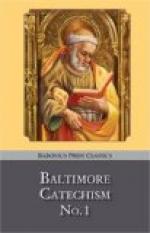380. Q. What is forbidden by the eighth Commandment? A. The eighth Commandment forbids all rash judgments, backbiting, slanders, and lies.
381. Q. What must they do who have lied about their neighbor and seriously injured his character? A. They who have lied about their neighbor and seriously injured his character must repair the injury done as far as they are able, otherwise they will not be forgiven.
382. Q. What is the ninth Commandment? A. The ninth Commandment is: Thou shalt not covet thy neighbor’s wife.
383. Q. What are we commanded by the ninth Commandment? A. We are commanded by the ninth Commandment to keep ourselves pure in thought and desire.
384. Q. What is forbidden by the ninth Commandment? A. The ninth Commandment forbids unchaste thoughts, desires of another’s wife or husband, and all other unlawful impure thoughts and desires.
385. Q. Are impure thoughts and desires always sins? A. Impure thoughts and desires are always sins, unless they displease us and we try to banish them.
386. Q. What is the tenth Commandment? A. The tenth Commandment is: Thou shalt not covet thy neighbor’s goods.
387. Q. What are we commanded by the tenth Commandment? A. By the tenth Commandment we are commanded to be content with what we have, and to rejoice in our neighbor’s welfare.
388. Q. What is forbidden by the tenth Commandment? A. The tenth Commandment forbids all desires to take or keep wrongfully what belongs to another.
LESSON THIRTY-FIFTH ON THE FIRST AND SECOND COMMANDMENTS OF THE CHURCH
389. Q. Which are the chief commandments of the Church? A. The chief commandments of the Church are six:
1. To hear Mass on Sundays and holydays of obligation.
2. To fast and abstain on the days appointed.
3. To confess at least once a year. 4. To
receive the Holy Eucharist during the Easter time.
5. To contribute to the support of our pastors.
6. Not to marry persons who are not Catholics,
or who are related to us
within the third degree of kindred,
nor privately without witnesses,
nor to solemnize marriage at forbidden
times.
390. Q. Is it a mortal sin not to hear Mass on a Sunday or a holyday of obligation? A. It is a mortal sin not to hear Mass on a Sunday or a holyday of obligation, unless we are excused for a serious reason. They also commit a mortal sin who, having others under their charge, hinder them from hearing Mass, without a sufficient reason.
391. Q. Why were holydays instituted by the Church? A. Holydays were instituted by the Church to recall to our minds the great mysteries of religion and the virtues and rewards of the saints.
392. Q. How should we keep the holydays of obligation? A. We should keep the holydays of obligation as we should keep the Sunday.
393. Q. What do you mean by fast-days? A. By fast-days I mean days on which we are allowed but one full meal.




